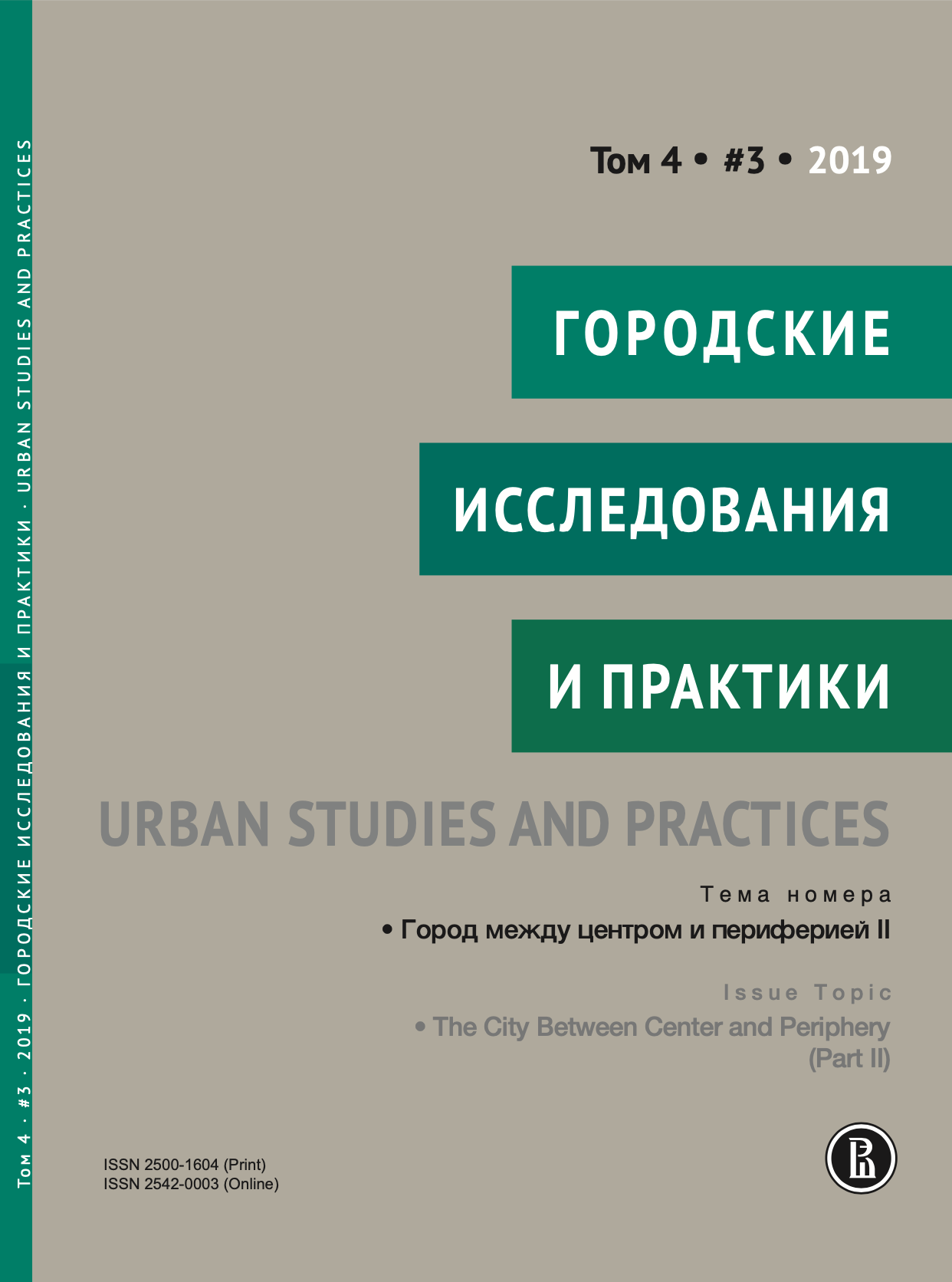Urban Heritage and Governmentality in St. Petersburg: Between Local and Global
Abstract
Using the example of an architectural competition for the reconstruction of Bolshaya Morskaya Street in St. Petersburg, this article focuses on the issue of the control of heritage. The 2016 architectural competition is examined to reveal the conflicting logic, discourse, and forms of rationalities in heritage management, mobilized by different participants of the planning process: professional architectural studios, civic groups, and government authorities. The article reveals what kind of discourses, technologies, and rationalities are used by those involved in creating the street’s architectural projects. The work contributes to the discussion of how control is disseminated between the center and the periphery. Using participant observation, discourse analysis of architectural concepts, analysis of normative documents, and interviews with civic groups the article reveals two types of rationality inscribed in the planning process in St. Petersburg. The projects of Bolshaya Morskaya Street show the coexistence of two planning paradigms which differ in in epistemic (forms of rationality) and discursive practices. One is based on State logic, when the State is considered as a key factor in the planning process. The second paradigm is built around market and civic logics, and citizen participation in urban planning. Representatives of the second paradigm attract market and international discourses, and build new civic identities.
Downloads
References
Балашов А.И., Санина А.Г. (2016) Стратегические ориентиры развития Санкт-Петербурга: противоречия декларируемых ценностей и практик городского управления//Журнал исследований социальной политики. Т. 14. №. 2. С. 197–212.
Батчаев А.Р., Жихаревич Б.С. (2014) Санкт-Петербург в постсоветский период: экономические стратегии и развитие//Экономические и социальные перемены: факты, тенденции, прогноз. № 4 (34). С. 68–83.
Каплун В. (2019) Перестать мыслить «власть» через «государство»: gouvernementalité, governmentality studies и что стало с аналитикой власти Мишеля Фуко в русских переводах//Логос. Т. 29. № 2. С. 179–220.
Atkinson R. (1999) Discourses of Partnership and Empowerment in Contemporary British Urban Regeneration//Urban Studies. Vol. 36. No. 1. P. 59–72.
Bocking S. (2006). Constructing Urban Expertise: Professional and Political Authority in Toronto, 1940–1970//Journal of Urban History. Vol. 33. No. 1. P. 51–76.
Brenner N., Peck J., Theodore N. (2010) Variegated Neoliberalization: Geographies, Modalities, Pathways//Global Networks. Vol. 10. No. 2. P. 182–222.
De Cesari C., Herzfeld M. (2015) Urban Heritage and Social Movements//Global Heritage: A Reader/ L. Meskell (ed.). Wiley-Blackwell. P. 171–195.
Coombe R., Weiss L. (2015) Neoliberalism, Heritage Regimes and Human Rights//Global Heritage: A Reader/ L. Meskell (ed.). Wiley-Blackwell. P. 43–69.
Dryzek J. (1993) Policy Analysis and Planning: From Science to Argument//The Argumentative Turn in Policy Analysis and Planning/F. Fischer,J. Forester (eds.). London: UCL Press. P. 215–232.
Fairclough N. (2001) The Discourse of New Labour: Critical Discourse Analysis//Discourse as Data: A Guide for Analysis/M. Wetherell, S. Taylor, S.J. Yates (eds.). London: Sage. P. 229–266.
Foucault M. Space, Knowledge and Power//The Foucault Reader/P. Rabinow (ed.). London: Penguin Books, 1984. P. 239–56.
Foucault M. (1991) Governmentality//The Foucault Effect: Studies in Governmentality/G. Burchell, C. Gordon, P. Miller (eds.). The University of Chicago Press, Chicago. P. 87–104.
Foucault M. (1994) Ethics: Subjectivity and Truth. The Essential Works of Michel Foucault, 1954–1984, Vol. 1/P. Rabinow (ed.). The New Press, New York.
Harris S.E. (2013) Communism on Tomorrow Street: Mass Housing and Everyday Life after Stalin. Woodrow Wilson Center Press.
Hajer M. (1996) Discourse Coalitions and the Institutionalisation of Practice: The Case of Acid Rain in Britain//The Argumentative Turn in Policy Analysis and Planning/F. Fischer,J. Forester (eds.). Durham,NC: Duke University Press.
Jacobs K. (2006). Discourse Analysis and its Utility for Urban Policy Research//Urban Policy and Research. Vol. 24. No. 1. P. 39–52.
Jones P. (2011) The Sociology of Architecture: Constructing Identities. Liverpool University Press.
Kuutma K. (2012) Between Arbitration and Engineering: Concepts and Contingencies in the Shaping of Heritage Regimes//Heritage Regimes and the State/R. Bendix et al. (eds.). Gottingen: Universitatsverlag Gottingen. P. 21–36.
Lees L. (2004) Urban Geography: Discourse Analysis and Urban Research, Progress in Human Geography. Vol. 28. No. 1. P. 101–107.
Li T.M. (2007) The Will to Improve: Governmentality, Development, and the Practice of Politics. Durham, NC: Duke University Press.
Mele C. (2000). The Materiality of Urban Discourse: Rational Planning in the Restructuring of the Early Twentieth-Century Ghetto//Urban Affairs Review. Vol. 35. No. 5. P. 628–648.
Newman I. (1996) Discourse and The Public Sector//Local Government Policy Making. Vol. 23. P. 52–59.
Ong A. (2007) Neoliberalism as a Mobile Technology//Transactions of the Institute of British Geographers. Vol. 32. No. 1. P. 3–8.
Rose N., Miller P. (2010) Political Power Beyond the State: Problematics of Government//The British Journal of Sociology. Vol. 61. No. 1. P. 271–303.
Rydin Y. (1998) The Enabling Local State and Urban Development: Resources, Rhetoric and Planning in East London//Urban Studies. Vol. 35. No. 2. P. 175–191.
Sharp E., Richardson T. (2001) Reflections on Foucaudian Discourse Analysis in Planning and Environmental Policy Research//Journal of Environmental Policy and Planning. Vol. 3. No. 3. P. 193–209.
Stenson K., Watt P. (1999) Governmentality and ‘the Death of the Social’?: a Discourse Analysis of Local Government Texts in South-East England//Urban Studies. Vol. 36. No. 1. P. 189–201.
Smith L. (2006). Uses of Heritage. London; New York: Routledge.
Smith F. (1999) Discourses of Citizenship in Transition: Scale, Politics and Urban Renewal//Urban Studies. Vol. 36. No. 1. P. 167–187.
Zhelnina A. (2013) Learning to Use “Public Space”: Urban Space in Post-Soviet St. Petersburg//The Open Urban Studies Journal. Vol. 6. No. 1. P. 57–64.

